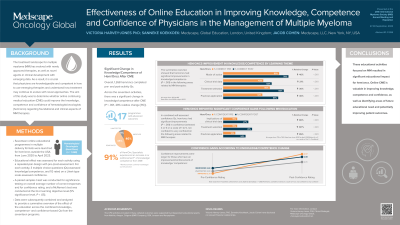Treatment of Relapsed/Refractory Myeloma
Poster Session 2
P-269: EFFECTIVENESS OF ONLINE EDUCATION IN IMPROVING KNOWLEDGE, COMPETENCE AND CONFIDENCE OF PHYSICIANS IN THE MANAGEMENT OF MULTIPLE MYELOMA
Thursday, September 28, 2023
12:30 PM - 1:30 PM EEST


Victoria Harvey-Jones, PhD
Clinical Strategist
WebMD/Medscape Oncology Global, United States
Introduction: The treatment landscape for multiple myeloma (MM) has evolved with newly approved therapies, as well as novel agents in clinical development with emerging data. As a result, it is crucial that physicians are knowledgeable and competent in how to use emerging therapies and understand how treatment may continue to evolve with novel approaches. The aim of this study was to determine whether online continuing medical education (CME) could improve the knowledge, competence and confidence of hematologist/oncologists (hem/oncs) regarding foundational and clinical aspects of MM therapies.
Methods: Seventeen online educational programmes in multiple delivery formats were launched for hem/oncs outside the USA from 2020 to 2023. Educational effect was assessed for each activity using a repeated-pair design with pre-/post-assessment. For each activity, 3 multiple choice questions (Qs) assessed knowledge/competence, and 1Q rated on a Likert-type scale assessed confidence. A paired samples t-test was conducted for significance testing on overall average number of correct responses and for confidence rating, and a McNemar’s test was conducted at the Q or learning objective level (5% significance level, P <.05). Data were subsequently combined and analyzed to provide a summative overview of the effect of the education across the combined knowledge-, competence- and confidence-based Qs from the seventeen programs.
Results: Overall, 1,268 hem/oncs completed pre- and post-activity Qs. Across the seventeen activities, there was a significant change in knowledge/competence after CME (P <.001, 28% relative change [RC]). 91% of hem/oncs either improved or reinforced their knowledge/competence, with 46% demonstrating an improvement. The summative overview showed that hem/oncs had significant improvements in knowledge/competence (P < 0.001) in the following areas related to MM therapies (Ns range from 264 to 861):
• Mode of action (40% RC)
• Clinical trial data (21% RC)
• Treatment selection (30% RC)
• Practical application (40% RC)
In combined self-assessed confidence Qs, hem/oncs had significant improvements (P < 0.001) in confidence (selected 4 or 5 on a scale of 1 to 5, not confident to very confident) in the following areas related to MM therapies (Ns range from 17 to 762):
• Implications of clinical trial data (80% RC)
• Treatment selection (107% RC)
• Practical application (85% RC)
Finally, confidence improvements were larger for those who had an improvement/reinforcement of knowledge/competence (unaffected: 2.39 pre-confidence to 2.70 post-confidence rating; improved: 2.31 pre-confidence to 2.97 post-confidence rating; reinforced: 2.49 pre-confidence to 2.97 post-confidence rating).
Conclusions: These educational activities focused on MM resulted in significant educational impact for hem/oncs. Online CME is valuable in improving knowledge, competence and confidence, as well as identifying areas of future educational need and potentially improving patient outcomes.
Methods: Seventeen online educational programmes in multiple delivery formats were launched for hem/oncs outside the USA from 2020 to 2023. Educational effect was assessed for each activity using a repeated-pair design with pre-/post-assessment. For each activity, 3 multiple choice questions (Qs) assessed knowledge/competence, and 1Q rated on a Likert-type scale assessed confidence. A paired samples t-test was conducted for significance testing on overall average number of correct responses and for confidence rating, and a McNemar’s test was conducted at the Q or learning objective level (5% significance level, P <.05). Data were subsequently combined and analyzed to provide a summative overview of the effect of the education across the combined knowledge-, competence- and confidence-based Qs from the seventeen programs.
Results: Overall, 1,268 hem/oncs completed pre- and post-activity Qs. Across the seventeen activities, there was a significant change in knowledge/competence after CME (P <.001, 28% relative change [RC]). 91% of hem/oncs either improved or reinforced their knowledge/competence, with 46% demonstrating an improvement. The summative overview showed that hem/oncs had significant improvements in knowledge/competence (P < 0.001) in the following areas related to MM therapies (Ns range from 264 to 861):
• Mode of action (40% RC)
• Clinical trial data (21% RC)
• Treatment selection (30% RC)
• Practical application (40% RC)
In combined self-assessed confidence Qs, hem/oncs had significant improvements (P < 0.001) in confidence (selected 4 or 5 on a scale of 1 to 5, not confident to very confident) in the following areas related to MM therapies (Ns range from 17 to 762):
• Implications of clinical trial data (80% RC)
• Treatment selection (107% RC)
• Practical application (85% RC)
Finally, confidence improvements were larger for those who had an improvement/reinforcement of knowledge/competence (unaffected: 2.39 pre-confidence to 2.70 post-confidence rating; improved: 2.31 pre-confidence to 2.97 post-confidence rating; reinforced: 2.49 pre-confidence to 2.97 post-confidence rating).
Conclusions: These educational activities focused on MM resulted in significant educational impact for hem/oncs. Online CME is valuable in improving knowledge, competence and confidence, as well as identifying areas of future educational need and potentially improving patient outcomes.
